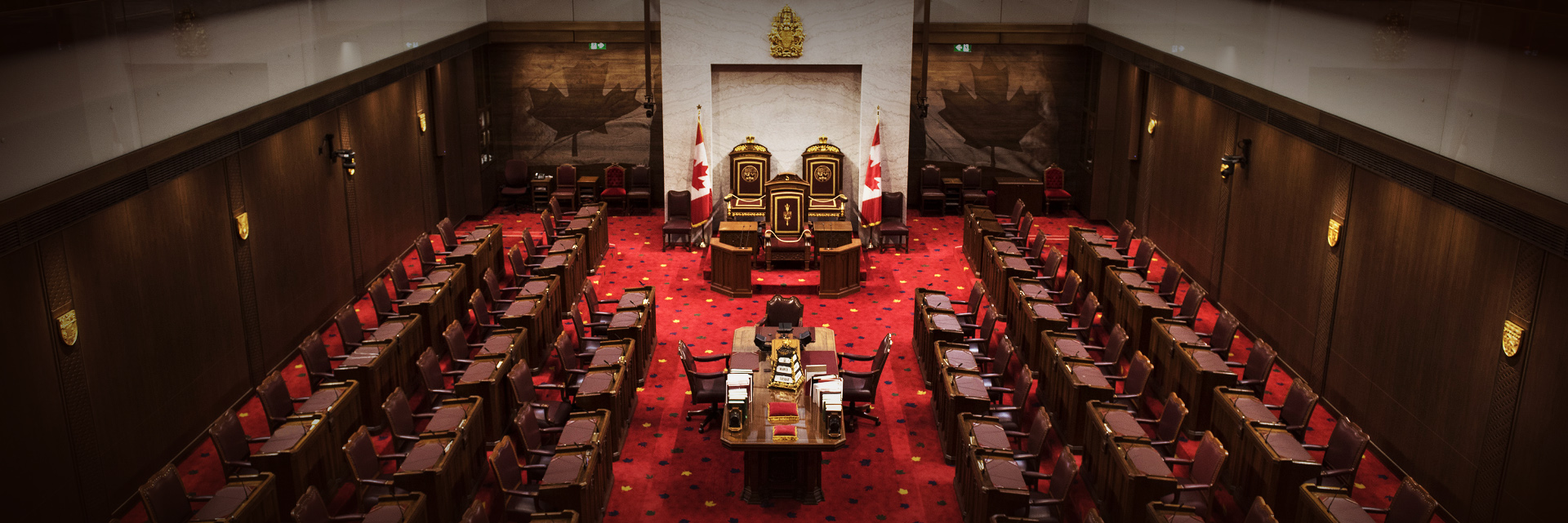
Study on New and Emerging Issues for Canadian Importers and Exporters with Respect to Competitiveness of Canadian Businesses in North American and Global Markets
Twenty-fourth Report of Banking, Trade and Commerce Committee and Request for Government Response—Debate Continued
November 8, 2018
The Honorable Senator Julie Miville-Dechêne:
Honourable senators, I too am rising at this late hour to discuss a delicate subject that prompted me to move the adjournment of the debate two weeks ago, when the Chair of the Standing Senate Committee on Banking, Trade and Commerce, Senator Doug Black, presented its report for adoption. The title of the report is Canada: Still open for business? I was not prepared, and I am still not prepared, to support the adoption of that report.
With all due respect to the members of that committee, I want to explain why. First, I was uncomfortable to note that the Banking Committee had invited the President of the Canadian Chamber of Commerce, Perrin Beatty, to take part in the press conference for the release of the report. Mr. Beatty had appeared before the committee and had called for a royal commission on taxation, a suggestion that is at the top of the list of the report’s recommendations.
Why then do I have misgivings? Throughout my career as a journalist, Radio-Canada ombudsman and chair of a research council, I dealt with the notions of ethics, equilibrium, conflicts of interest, and maintaining distance from sources. Of course, the Senate is not a newsroom or a research institute, but as politicians, we must do everything, yes, everything, to maintain public trust in the Senate as an institution and avoid reinforcing any preconceived notions that we are beholden to the most powerful lobbies.
I want to clarify that I’m talking about perception and appearance. Unfortunately, associating the highly influential Canadian Chamber of Commerce with the release of a Senate report could give the impression that the Senate is aligned with this business lobby. I think that the Senate should always be seen as protecting the greater good and public interest. It should not be associated with any lobby, whether it be a business lobby, union lobby, or any group that makes recommendations to the government and has a financial interest in the issues or bills the Senate is studying.
Following the press conference, as I read the report and the testimony closely, reviewed the list of witnesses and did a little research, my discomfort grew. According to its order of reference, the committee was to examine new and emerging issues for Canadian importers and exporters with respect to the competitiveness of Canadian businesses in North American and global markets. After hearing from 21 witnesses, the committee’s recommendation to the government was nothing less than to immediately reduce the corporate income tax rate.
Most of the witnesses who appeared represented the business community and the oil sector. The list included the Canadian Energy Pipeline Association, Suncor and the Canadian Association of Petroleum Producers, plus experts from think tanks, such as the Fraser Institute, that advocate for economic liberalism, and four witnesses from academia. What is striking is how well the oil industry was represented on the witness list. There were no witnesses from any other sector. I noted a lack of ideological diversity among the think tanks invited to the table. For example, the more progressive Canadian Centre for Policy Alternatives and the Broadbent Institute were not invited.
On October 30, in response to the report, a Broadbent Institute advisor wrote in The Globe and Mail that corporate tax cuts are not the right way to go because that is not the most decisive factor for investors.
The only testimony in support of the carbon tax came from Canada’s Ecofiscal Commission, but it was excluded from the report. Only two dissenting opinions appear in the report.
The committee’s witnesses painted an alarming picture of the situation. Canada lost the competitive advantage it needs to attract businesses with the uncertainty associated with renegotiating the free trade agreement with our neighbours to the south, but especially when the United States adopted the Tax Cuts and Jobs Act, in December 2017, a law that changes both personal and corporate taxes. As everyone knows, to our great relief, between the start of the work on the report and its publication, a new free trade agreement was concluded with the United States, so at least some of the uncertainty mentioned by the witnesses has dissipated.
(1710)
In its recommendations, the committee does not take into account the call for prudence of at least one of the witnesses: Fred O’Riordan from Ernst & Young. He refused to make any recommendations to the committee for any immediate, ad hoc, and piecemeal changes, including lowering taxes, and I quote:
I honestly feel it is better to do a comprehensive review, partly because tax policy is complicated and making a particular change in one area inevitably will have impacts on other areas, both in the tax system and the non-tax system.
Fred O’Riordan also provided some background for the issue, which is oddly missing from the Senate report, and I quote:
Since 2000, Canadian federal and provincial governments have gradually reduced business taxes to attract investment here, primarily by implementing staged reductions in corporate tax rates, eliminating taxes on capital and reducing taxes on business inputs.
Under these circumstances, is there really an urgent need to reduce corporate taxes before undertaking a more comprehensive study of taxation and competitiveness? I find this to be a very legitimate question. Not everyone has such an alarmist view of the probable impacts of this new American legislation on investment in Canada.
In his October 2018 report entitled Economic and Fiscal Outlook, the Parliamentary Budget Officer stated:
We maintain our assumption that the U.S. Tax Cuts and Jobs Act (TCJA) will not have a material impact on Canada’s investment climate.
. . . the TCJA is projected to reduce the U.S. marginal effective tax rate on new investment slightly below Canadian rates over 2018 to 2022 . . . . However, beyond 2022 some of the tax advantages, prominently 100 per cent expensing provisions for capital, are phased out. With each deduction removed, U.S. competitiveness decreases.
The report continues:
While Canada’s corporate tax advantage relative to the United States has declined, it is important to recall that firms’ investment decisions are based on more than taxes alone. In the case of foreign direct investment (FDI), the OECD notes that it is encouraged by “access to markets and profit opportunities; a predictable and non-discriminatory legal and regulatory framework; macroeconomic stability; skilled and responsive labor markets and well-developed infrastructure.”
To date, FDI flows do not suggest an immediate deterioration of Canada’s investment climate.
The Parliamentary Budget Officer is not on the committee’s list of witnesses. The Governor of the Bank of Canada, Stephen Poloz, testified before the committee, but his much more encouraging view of Canada’s economic situation is not included in the committee’s report. He said:
. . . where we do have some growth in investment is in the non-energy sector over the forecast horizon, and that’s coming from the fact that many industries, both domestic and export-oriented, are at their capacity. They have all of the incentives — and they tell us that they do — to invest.
Mr. Poloz went on to say the following:
One area that I would say is doing relatively well is services and, in particular, ICT services. So it’s quite important not to paint all export-oriented industries with the same brush.
Stephen Poloz warned the committee against taking a too simplistic view of the competitiveness of a business, which includes all input costs such as electricity, paperwork and regulations.
Lastly, I thought it important to quote something one of the witnesses said about the impact of the Tax Cuts and Jobs Act, which also didn’t make it into the final report. Jeremy Kronick, a policy analyst with the C.D. Howe Institute, believes that lower corporate taxes in the U.S. can’t last. Here is what he said:
It’s easy to say they will be lower and will stimulate business, that’s fine, but don’t forget that this budget will add $1 trillion to the deficit. We are talking about significant percentages each year to a deficit that was already quite big. So at some point down the line, one might see tax rates moving back up to pay for some of this deficit spending.
The [American] government spending is likely to stoke further inflation, which is likely to cause the fed to have to increase interest rates, which has a different set of impacts on Canada.
There is a lot to think about. It is not as simple as just the relative competitive tax rates on that front.
In conclusion, I would have liked the committee report to be more balanced and nuanced with respect to the possible consequences that losing that tax advantage could have on our economy. Economists do not agree about either the consequences of the American law or the factors that help Canadian businesses compete.
Lastly, corporate and individual tax rates are also social choices. That revenue provides Canadians with more equitable benefits than those available to our American neighbours. Our public services, such as health care and education, improve the quality of our labour force, and that is an important factor in Canadian competitiveness. Thank you.

